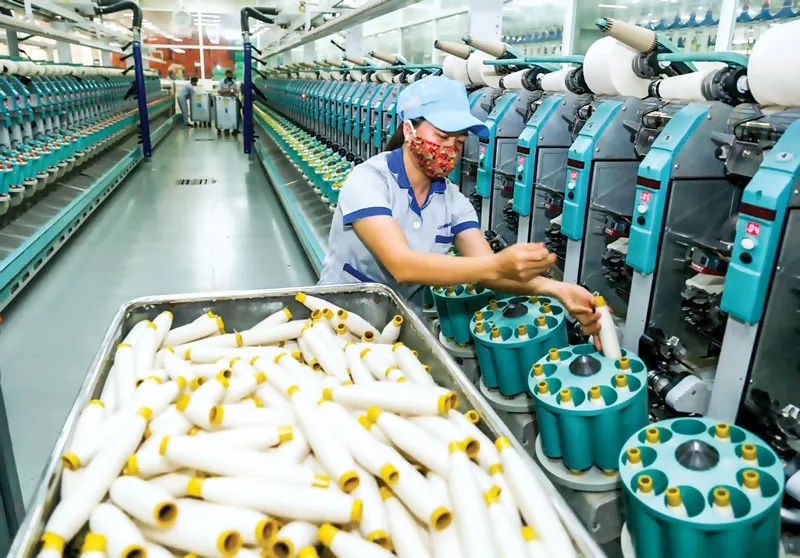
These enterprises are faced with a shortage of raw materials, parts and components for assembly of products for exports. Saigon Investment discussed the seriousness of this issue in an exchange with Mr. Pham Viet Anh, a business growth strategy consultant.
JOURNALIST: - Sir, on 10 February, Hepza Business Association (HBA) sent an "express" document to the Prime Minister, and other ministries and agencies proposing urgent solutions for goods circulating between Vietnam and China due to lack of raw materials and components for production. Does this show the important role of the supply chain ?
Mr. PHAM VIET ANH: - The supply chain is vital for strategic planning. In fact, the supply chain accounts for 80% of an organizations cost and in manufacturing companies it accounts for 60% of the value of inventory, factories, warehouses, vehicles and other valuable assets within the chain. In some companies, the quality of input material is part of the growth, which shows that the supply chain is a decisive factor in all production.
Previously, Vietnam had a trade surplus with the US and a trade deficit with China. We mainly import intermediary raw materials, and in essence Vietnam is still a labor intensive outsourcing economy, but the value-added products do not amount to much volume. When the Covid-19 epidemic broke out, it had an immediate affect on Vietnamese production, because even the bigger FDI enterprises like Samsung also import components from China. The key problem is that we have not developed any support industry, so we are faced with greater risks.
In the case of shortage of raw materials and production components, many people are of the view that businesses can import from other supply markets. In my opinion, we can import from any country but we need to pay attention to competitiveness. Enterprises can import components and raw materials from another source instead of China for a short term at a higher price, but in the long run, they cannot compete, because an outsourcing economy is much cheaper. So if we want to find another alternate source of supply, other than China, it must be at a competitive price only.
If China changes its structure from low-cost manufacturing to higher cost, the countries that develop support industries, such as India or Bangladesh, are alternate sources and we can still buy cheap accessories. In the event that China does not convert, in the long term we have to return to buying goods from this country because the price is very important. If we can proactively produce domestically, that will be best, because importing from another country is being dependent.
- Sir, why do Vietnamese businesses not see the problem that they are too dependent on raw materials from China?
- Businesses have in fact redirected and diversified the supply of raw materials to ensure production stability, but in order to have more businesses involved in developing support industries, the State must have specific incentive policies, which requires great determination on the part of the State and ministries. Even in the automotive support industry, the "backbone" of all support industries, we have not been able to do much so far. The supply chain disruption again suggests that we must diversify both input and output.
Currently, we have a trade surplus with the US, which is benefiting but also involves many risks. Therefore, it has to redirect to other markets like EU or markets with FTAs with Vietnam. Particularly for FTAs, if we do not take advantage of this, it will cause business disadvantages, because the opposite of free trade is to eliminate production. Therefore, if domestic products are not competitive, domestic enterprises will fail.
- Sir, why were so many industries and businesses affected directly by Covid-19, was it due to lack of restructuring?
- Restructuring is easier said than done. For example, the tourism industry mentions restructuring of visitors, but we cannot ban Chinese tourists. It is necessary to create policies to encourage guests from other countries. Especially after the epidemic, the tourism industry should exempt visas for all visitors from the EU. Especially when EVFTA has been officially approved by the EU, the Government should abandon conditional tourist visas for European tourists in the remaining countries.
In the EU, the government and the media have a view that the consequences of Covid-19 are not as serious as in other countries, which is an advantage for Vietnam's tourism industry to exploit and promote. Accordingly, destination marketing programs need to be implemented at the same time as promotion policies for hotel rooms.
It should be noted that after Covid-19, in the short term, the easing of currencies and the reduction of Chinese interest rates may make the cost of importing raw materials for domestic production and businesses more comfortable, but will also increase pressure on trade deficit, exchange rate and inflation, as well as in the long run, increase input dependence from China.
This is the problem that the Government needs to resolve urgently. In the immediate future, it is necessary to develop support industries and adjust policies to attract higher quality FDI. The most necessary and immediate condition is to prepare a mechanisms for social compensation when restructuring, upgrading education, improving the quality of vocational training, and raising the liberalization of financial markets, in order to diversify resources.
- Thank you very much.




















